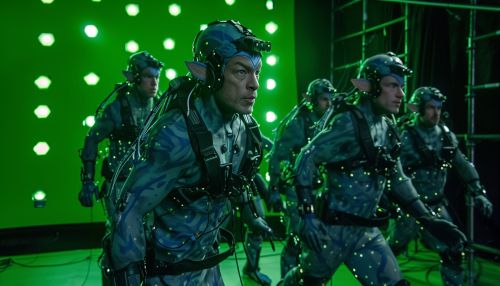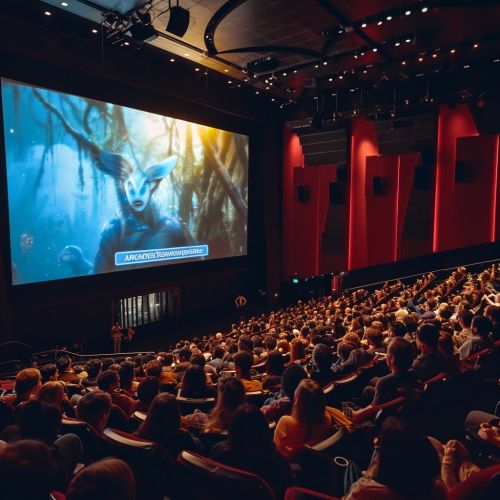Avatar (2009 film)
Production
"Avatar" is a 2009 American epic science fiction film directed, written, produced, and co-edited by James Cameron, and starring Sam Worthington, Zoe Saldana, Stephen Lang, Michelle Rodriguez, and Sigourney Weaver. The film is set in the mid-22nd century when humans are colonizing Pandora, a lush habitable moon of a gas giant in the Alpha Centauri star system, in order to mine the mineral unobtanium, a room-temperature superconductor.


The film's development and production were a significant undertaking. Cameron wrote a 114-page scriptment for "Avatar" in 1995, and announced in 1996 that he would direct the film after completing "Titanic". In the interim, Cameron spent several years developing the script, the characters, and the fictional universe, which he described as "every single science fiction book I read as a kid", drawing inspiration from "every single science fiction book I read as a kid".
The production of "Avatar" required new film-making techniques to be developed. Cameron had originally intended to make the film after completing "Titanic", but the technology was not yet available to achieve his vision of the film. Instead, Cameron began developing the technology necessary to make the film. This included a new, more advanced motion capture technology, which was able to accurately capture the facial expressions of the actors.
The production of "Avatar" was a massive undertaking, with a budget estimated at over $237 million. The film was primarily shot in New Zealand, with additional filming taking place in Hawaii. The film's production was notable for its extensive use of new motion capture filming techniques, and its development of a new language, Na'vi, for the film's extraterrestrial race.
Plot
"Avatar" follows the story of Jake Sully (Sam Worthington), a paraplegic former Marine, who is selected to participate in the Avatar Program, a project that enables humans to remotely control bioengineered human-Na'vi hybrids, known as "Avatars", in order to interact with the native Na'vi population of Pandora.


Upon arrival on Pandora, Jake is assigned to replace his deceased twin brother, a trained scientist, in the Avatar Program. Jake is initially interested only in his paycheck and the possibility of regaining use of his legs, but he quickly becomes fascinated with the Na'vi culture and way of life. He falls in love with a Na'vi woman, Neytiri (Zoe Saldana), and as he learns more about the Na'vi, he begins to question the morality of the humans' actions on Pandora.
The film's climax comes when the humans decide to destroy the Na'vi's home tree in order to access the valuable unobtanium deposit beneath it. Jake, now fully integrated into the Na'vi society, leads a rebellion against the humans, resulting in a large-scale battle. The film ends with Jake permanently transferring his consciousness to his Avatar, choosing to live the rest of his life as a Na'vi.
Reception
Upon its release, "Avatar" was met with critical acclaim. Critics praised the film's groundbreaking visual effects, immersive 3D cinematography, and imaginative setting. The film's environmental message, as well as its depiction of colonialism and indigenous cultures, were also widely discussed.


"Avatar" was a massive box office success, grossing over $2.8 billion worldwide, making it the highest-grossing film of all time at the time of its release. The film also won numerous awards, including three Academy Awards for Best Art Direction, Best Cinematography, and Best Visual Effects.
Despite its success, "Avatar" has also been the subject of criticism. Some critics have accused the film of being derivative, comparing its plot to those of "Dances with Wolves", "Pocahontas", and "The Last Samurai". Others have criticized the film's dialogue and character development. However, the film's impact on the film industry and popular culture has been undeniable, with its influence seen in a range of subsequent films and media.
Legacy and Impact
"Avatar" had a significant impact on the film industry. The film's success led to a resurgence in 3D cinema, with many subsequent films being released in 3D in an attempt to replicate "Avatar"'s success. The film's innovative use of motion capture technology also had a significant impact, leading to its use in many subsequent films.


The film's environmental message has also had a lasting impact, with many viewers and critics noting its relevance in the context of ongoing environmental issues. The film's depiction of colonialism and indigenous cultures has also been the subject of much discussion and analysis.
Since the release of "Avatar", there have been multiple announcements regarding sequels. As of now, four sequels are planned, with the first, "Avatar 2", set to be released in December 2022.
